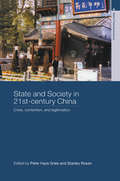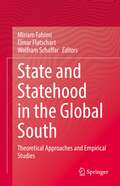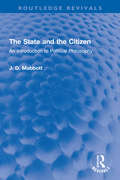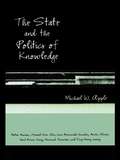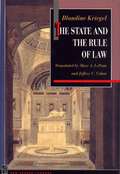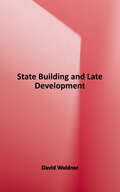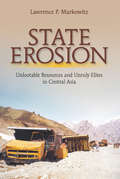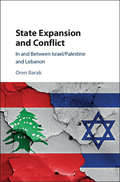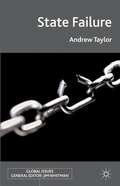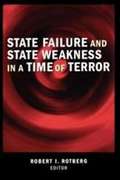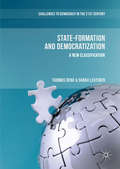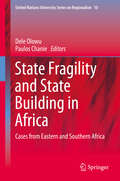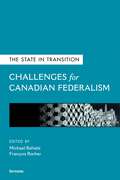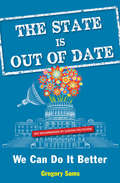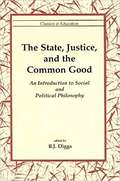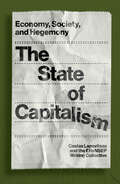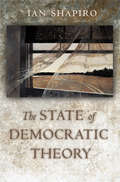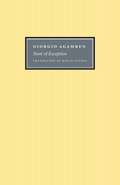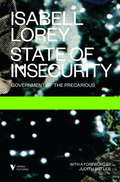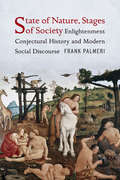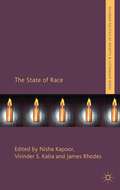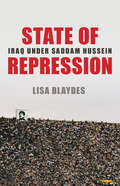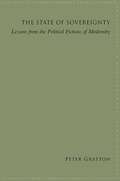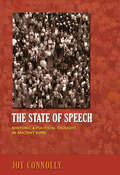- Table View
- List View
State and Society in 21st Century China: Crisis, Contention and Legitimation (Asia's Transformations)
by Stanley Rosen Peter Hays GriesWritten by a team of leading China scholars, this book explores the dynamics of state power and legitimation in twenty-first century China, and the implications of changing state-society relations for the future viability of the People's Republic. Key subjects covered include: the legitimacy of the Communist Party, state-society relations, ethnic and religious resistance, rural and urban contention, nationalism, popular and youth culture, prospects for democracy.
State and Statehood in the Global South: Theoretical Approaches and Empirical Studies
by Miriam Fahimi Elmar Flatschart Wolfram SchaffarThis book focuses on critical approaches to the state and state theory in the Global South. In light of the reemergence of the post-colonial and peripheral state as a crucial institution and actor in the 21st century’s capitalist world-system, the book examines the nature, functions and development dynamics of the state in the periphery, as well as its constituting interests and struggles. Drawing on the works of Poulantzas and Gramsci, dependency and world-systems theory, as well as the regulation school and the German Ableitungsdebatte, stategraphy and critical realism, it analyzes the development of different theoretical perspectives on the state, elaborates on their theoretical, ontological and epistemological presuppositions, and illustrates their methodological, practical and ethical implications. The book is divided into three parts, the first of which provides an overview of recent global capitalist developments and challenges for state theory and lays the theoretical, ontological and hermeneutic foundation for studies of the state and statehood in the Global South. In turn, the second part introduces readers to different schools of state theory, including critical theory and materialism, as well as approaches derived from postcolonial, anthropological, and feminist thought. Lastly, the third part presents various empirical studies, highlighting concrete methodological and practical experiences of conducting critical state theory.
The State and the Citizen: An Introduction to Political Philosophy (Routledge Revivals)
by J. D. MabbottFirst published in 1948, The State and the Citizen traces the development of the idea of the State as the ultimate source of authority. The author then proceeds to suggest the proper ends and limitation of State action. He analyses the conceptions of State unity and corporate loyalty and ends with a discussion on the relations between States and other associations, and between one State and another. This short and lucid introduction to political philosophy is an essential read for students and scholars of political philosophy, philosophy, and political studies.
The State and the Politics of Knowledge
by Michael W. AppleThe State and the Politics of Knowledge extends the insightful arguments Michael Apple provided in Educating the "Right" Way in new and truly international directions. Arguing that schooling is, by definition, political, Apple and his co-authors move beyond a critical analysis to describe numerous ways of interrupting dominance and creating truly democratic and realistic alternatives to the ways markets, standards, testing, and a limited vision of religion are now being pressed into schools.
The State and the Rule of Law (New French Thought Series)
by Blandine KriegelBlandine Kriegel, at one time a collaborator with Michel Foucault, is one of France's foremost political theorists. This translation of her celebrated work L'Etat et les esclaves makes available for English-speaking readers her impassioned defense of the state. Published in France in 1979 and republished in 1989, this work challenged not only the anti-statism of the 1960s but also generations of romanticism in politics that, in Kriegel's view, inadvertently threatened the cause of liberty by refusing to distinguish between the despotic and the lawful state.In a work that addresses the urgent concerns of Europe and the contemporary world as a whole, Kriegel examines the background of modern liberal democracy in the late seventeenth and eighteenth centuries and argues cogently for the future of constitutional social-democracy. She maintains, among other positions, that European liberal democracies would have been impossible without the political basis provided by the lawful state first developed by monarchies. She also shows that early modern centralized states became liberal insofar as they developed a centralized legal system, rather than a centralized administration. In developing these ideas, she presents a picture of the state as a major force for human liberty.
State Building and Late Development
by David WaldnerWhy does state building sometimes promote economic growth and in other cases impede it? Through an analysis of political and economic development in four countries? Turkey, Syria, Korea, and Taiwan? This book explores the origins of political-economic institutions and the mechanisms connecting them to economic outcomes. <p><p>David Waldner extends our understanding of the political underpinnings of economic development by examining the origins of political coalitions on which states and their institutions depend. He first provides a political model of institutional change to analyze how elites build either cross-class or narrow coalitions, and he examines how these arrangements shape specific institutions: state-society relations, the nature of bureaucracy, fiscal structures, and patterns of economic intervention. He then links these institutions to economic outcomes through a bargaining model to explain why countries such as Korea and Taiwan have more effectively overcome the collective dilemmas that plague economic development than others such as Turkey and Syria. The latter countries, he shows, lack institutional solutions to the problems that surround productivity growth. <p><p>The first book to compare political and economic development in these two regions, State Building and Late Development draws on, and contributes to, arguments from political sociology and political economy. Based on a rigorous research design, the work offers both a finely drawn comparison of development and a compellingly argued analysis of the character and consequences of "precocious Keynesianism," the implementation of Keynesian demand-stimulus policies in largely pre-industrial economies.
State Erosion: Unlootable Resources and Unruly Elites in Central Asia
by Lawrence P. MarkowitzState failure is a central challenge to international peace and security in the post–Cold War era. Yet theorizing on the causes of state failure remains surprisingly limited. In State Erosion, Lawrence P. Markowitz draws on his extensive fieldwork in two Central Asian republics—Tajikistan, where state institutions fragmented into a five-year civil war from 1992 through 1997, and Uzbekistan, which constructed one of the largest state security apparatuses in post-Soviet Eurasia—to advance a theory of state failure focused on unlootable resources, rent seeking, and unruly elites. In Tajikistan, Uzbekistan, and other countries with low capital mobility—where resources cannot be extracted, concealed, or transported to market without state intervention—local elites may control resources, but they depend on patrons to convert their resources into rents. Markowitz argues that different rent-seeking opportunities either promote the cooptation of local elites to the regime or incite competition over rents, which in turn lead to either cohesion or fragmentation. Markowitz distinguishes between weak states and failed states, challenges the assumption that state failure in a country begins at the center and radiates outward, and expands the "resource curse" argument to include cash crop economies, where mechanisms of state failure differ from those involved in fossil fuels and minerals. Broadening his argument to weak states in the Middle East (Syria and Lebanon) and Africa (Zimbabwe and Somalia), Markowitz shows how the distinct patterns of state failure in weak states with immobile capital can inform our understanding of regime change, ethnic violence, and security sector reform.
State Expansion and Conflict: In and between Israel/Palestine and Lebanon
by Oren BarakLebanon and Israel/Palestine are two political entities that expanded in 1920 and 1967 respectively, and became divided societies characterized by periods of stability and conflict. This book provides the first detailed comparison between the two states and also explores the effects of their expansion on their changing relations. It looks first at how both expanded states attempted to cope with their predicaments, focusing on the relationship between state, community and security, before moving on to analyze the de-stabilizing effects of expansion on Israeli-Lebanese relations. The book draws on previously unpublished official documents, memoirs, media resources and films produced in Lebanon and Israel/Palestine, in addition to existing works on the two states and the Middle East. Bridging the gap between comparative politics and international relations, it will interest students of Lebanon and Israel/Palestine, the Middle East, and conflict and peace.
State Failure
by Andrew TaylorAndrew Taylor provides an overview of the origins, evolution, and impact of state failure since the 1990s. Avoiding quickly outdated country-based case studies, he focuses on failure as a process rather than an event, putting contemporary usage in a wider historical context.
State Failure and State Weakness in a Time of Terror
by Robert I. RotbergState Failure and State Weakness in a Time of Terror develops an innovative theory of state failure that classifies and categorizes states along a continuum from weak to failed to collapsed. By understanding the mechanisms and identifying the tell-tale indicators of state failure, it is possible to develop strategies to arrest the fatal slide from weakness to collapse. This state failure paradigm is illustrated through detailed case studies of states that have failed and collapsed, states that are dangerously weak, and states that are weak but safe.
State-Formation and Democratization: A New Classification (Challenges to Democracy in the 21st Century)
by Thomas Denk Sarah LehtinenThis book examines the connection between two major developments in the world: state-formation and democratization. Since 1946, the number of states has increased from 66 to almost 200 independent states, but our knowledge of these state-formation processes is limited. The authors present a new database on state-formation and democratization, which enables novel classifications and analyses of these processes on the global level. They argue that the form of state-formation affects the probability for democratization in new states and that the initial regime that state-formation establishes at the time of independence has long-term effects on new states’ democratization.
State Fragility and State Building in Africa
by Dele Olowu Paulos ChanieThis book describes the contrast between the strong economic growth and democratization that have occurred in Africa and its stalling political progress. It presents and discusses fragility as the phenomenon that has caused the state to remain weak and faltering and has led to at least one third of the continent's citizens living in fragile states. Following the examination of the drivers of fragility and the impact of fragility on citizens and neighbouring states, the book discusses capacity building approaches. This part shows how effective states can be built on the African continent, a process that would result in a change from state fragility to state resilience. It is based on lessons learnt from close studies of the nations where the state has been most developed in the region, in Eastern and Southern Africa. The book provides and responds to the most recent and up-to-date information on African development and uses insights of people who have lived and worked in the continent for most of their lives.
The State in Transition: Challenges for Canadian Federalism
by Robert Talbot Thomas O. Hueglin Jeremy A. Clarke Daniel Bourgeois Patrick Fafard M François Rocher Andrew Bourns Peter Graefe Raffaele Iacovino Geneviève Nootens Geoffrey Hale France Morrissette Brooke JeffreyCanadian federalism, as a particular form of political organization for a complex society—with multiple economic, political, geographic, cultural, and national divides—faces important challenges. The political realignment that brought the Conservative Party to power in the last quinquennium has set in motion a significant transformation of the Canadian state and its federal system of governance. The contributors in this collection focus on three recurrent themes: the issues arising from the management of ethno-cultural diversity; the existence of internal nations in Canada (the First Nations and the Quebec nation in Quebec), the presence of linguistic minorities (French and English), and the questions of identity linked to citizenship in a federal context that allows for the presence of multiple loyalties; and the specific challenges raised by globalization and the extension of economic integration, particularly between the United States and Canada. This collection of studies on the role of the state reveals that our understanding of the evolution of the Canadian state, and of the ensuing impact on federalism and federal-provincial relations, is not as complete as it should be.
The State Is Out of Date: We Can Do It Better
by Gregory Sams&“A humorous and at times brutally honest overview on many of the problems . . . that we presently endure through our political and cultural divide.&”—Robert Steven Thomas, author of Intelligent Intervention As disillusioned citizens across the planet take to the streets, do you wonder if the world&’s nation states will ever get it right? Does anyone really think that politics is working—aside from those in power and behind it? What if living together in peace and harmony is a more natural condition than what we experience in today&’s conflict-driven culture? We are community animals with built-in empathy, good at organizing things and helping each other out. The most essential and reliable features of our culture arose without top-down planning by a state that has one basic objective—to stay in power. We have enjoyed enduring civilizations in the past governed wholly from the bottom-up, without need of a shepherd and sheepdogs. We can do it again and are more connected than ever before. The State Is Out of Date reassures us that politics is not even the primary game in town, though it sometimes may seem like the only one. It is a book for all those who wonder why politics isn&’t working and what would. &“A book of immense importance that also happens to be immensely readable. Get it now, read it now. You&’ll be amazed, impressed, persuaded, infuriated and filled with hope for a future that awaits us if only we are prepared to make the right choices.&”—Graham Hancock, New York Times bestselling author of America Before &“Gregory Sams is a prophet of conscience.&”—Lanny Cotler, film writer and director
The State, Justice, and the Common Good: An Introduction to Social and Political Philosophy
by B. J. DiggsThe State, Justice, and the Common Good An Introduction to Social and Political Philosophy
The State of Capitalism: Economy, Society, and Hegemony
by Costas Lapavitsas EReNSEP Writing CollectiveThinking beyond pandemic capitalismThe health emergency that broke out in 2020 is a landmark event in the development of capitalism, confirming the underlying change signalled by the Great Crisis of 2007-9. The pandemic has catapulted the state to the centre of economic activity. However, a historic impasse is steadily becoming apparent at the core of the world economyProductive accumulation is flaccid, as both profitability and labour productivity are weak. Financialisation has entered a new phase, as &“shadow banking&” grew relative to other banks but is entirely dependent on the state. The power of the state derives from command over fiat money and can certainly deliver enormous boosts to aggregate demand, but that is not enough to tackle the weakness of the productive sector.The rise in inflation for the first time in forty years indicates the impasse. There is a transparent need for intervention on the supply side, directly challenging capitalist property rights. There is no evidence, however, that the ruling blocs in core countries would engage in such policies.The pandemic crisis also brought to the fore fresh divisions of core and periphery across the world economy. Imperialism has assumed new forms, spurred by globally active financial capital and internationalised productive capital. A renewed contest for hegemony has emerged as US power declined. The economic challenge of China will unfold steadily in the years ahead, intensifying political tensions and military rivalries.This book is the work of a research collective comprising authors from several parts of the world. It analyses these vital issues from the perspective of Marxist political economy and puts forth alternative anticapitalist proposals.
The State of Democratic Theory
by Ian ShapiroWhat should we expect from democracy, and how likely is it that democracies will live up to those expectations? In The State of Democratic Theory, Ian Shapiro offers a critical assessment of contemporary answers to these questions, lays out his distinctive alternative, and explores its implications for policy and political action. Some accounts of democracy's purposes focus on aggregating preferences; others deal with collective deliberation in search of the common good. Shapiro reveals the shortcomings of both, arguing instead that democracy should be geared toward minimizing domination throughout society. He contends that Joseph Schumpeter's classic defense of competitive democracy is a useful starting point for achieving this purpose, but that it stands in need of radical supplementation--both with respect to its operation in national political institutions and in its extension to other forms of collective association. Shapiro's unusually wide-ranging discussion also deals with the conditions that make democracy's survival more and less likely, with the challenges presented by ethnic differences and claims for group rights, and with the relations between democracy and the distribution of income and wealth. Ranging over politics, philosophy, constitutional law, economics, sociology, and psychology, this book is written in Shapiro's characteristic lucid style--a style that engages practitioners within the field while also opening up the debate to newcomers.
State of Exception
by Giorgio Agamben Kevin AttellTwo months after the attacks of 9/11, the Bush administration, in the midst of what it perceived to be a state of emergency, authorized the indefinite detention of non citizens suspected of terrorist activities and their subsequent trials by a military commission. Here, distinguished Italian philosopher Giorgio Agamben uses such circumstances to argue that this unusual extension of power, or "state of exception", has historically been an under examined and powerful strategy that has the potential to transform democracies into totalitarian states. The sequel to Agamben's "Homo Sacer: Sovereign Power" and "Bare Life, State of Exception" is the first book to theorize the state of exception in historical and philosophical context. In Agamben's view, the majority of legal scholars and policymakers in Europe as well as the United States have wrongly rejected the necessity of such a theory, claiming instead that the state of exception is a pragmatic question. Agamben argues here that the state of exception, which was meant to be a provisional measure, became in the course of the twentieth century a normal paradigm of government. Writing nothing less than the history of the state of exception in its various national contexts throughout Western Europe and the United States, Agamben uses the work of Carl Schmitt as a foil for his reflections as well as that of Derrida, Benjamin, and Arendt.
The State of Freedom: A Social History of the British State since 1800
by Patrick JoyceWhat is the state? The State of Freedom offers an important new take on this classic question by exploring what exactly the state did and how it worked. Patrick Joyce asks us to re-examine the ordinary things of the British state from dusty government files and post offices to well-thumbed primers in ancient Greek and Latin and the classrooms and dormitories of public schools and Oxbridge colleges. This is also a history of the 'who' and the 'where' of the state, of the people who ran the state, the government offices they sat in and the college halls they dined in. Patrick Joyce argues that only by considering these things, people and places can we really understand the nature of the modern state. This is both a pioneering new approach to political history in which social and material factors are centre stage, and a highly original history of modern Britain.
State of Insecurity
by Judith Butler Isabell Lorey Aileen DeriegYears of remodelling the welfare state, the rise of technology, and the growing power of neoliberal government apparatuses have established a society of the precarious. In this new reality, productivity is no longer just a matter of labour, but affects the formation of the self, blurring the division between personal and professional lives. Encouraged to believe ourselves flexible and autonomous, we experience a creeping isolation that has both social and political impacts, and serves the purposes of capital accumulation and social control.In State of Insecurity, Isabell Lorey explores the possibilities for organization and resistance under the contemporary status quo, and anticipates the emergence of a new and disobedient self-government of the precarious.From the Trade Paperback edition.
State of Nature, Stages of Society: Enlightenment Conjectural History and Modern Social Discourse (Columbia Studies in Political Thought / Political History)
by Frank PalmeriFrank Palmeri sees the conjectural histories of Rousseau, Hume, Herder, and other Enlightenment philosophers as a template for the development of the social sciences in the nineteenth and early twentieth centuries. Without documents or memorials, these thinkers, he argues, employed conjecture to formulate a naturalistic account of society's commercial and secular progression. Palmeri finds evidence of speculative frameworks in the political economy of Malthus, Martineau, Mill, and Marx. He traces the influence of speculative thought in the development of anthropology and ethnography in the 1860s, the foundational sociology of Comte and Spencer, and the sociology of religion pioneered by Weber, Durkheim, and Freud. Conjectural histories reveal a surprising ambivalence toward progress, modernity, and secularization among leading thinkers of the time, an attitude that affected texts as varied as Darwin's Descent of Man, Nietzsche's Genealogy of Morality, and the novels of Walter Scott, George Eliot, and H.G. Wells. Establishing the critical value of conjectural thinking in the study of modern forms of knowledge, Palmeri concludes his investigation with its return in the work of Foucault and in recent histories on early religion, political organization, and material life.
The State of Race
by Nisha Kapoor Virinder S. Kalra James RhodesThis book analyses the nature of the contemporary racial state, exploring issues such as the nature of postraciality, racial neoliberalism, the state of multiculturalism and whiteness, alongside the functioning of state institutions and policy concerning the military, education, community surveillance, asylum and extradition.
State of Repression: Iraq under Saddam Hussein
by Lisa BlaydesA new account of modern Iraqi politics that overturns the conventional wisdom about its sectarian divisionsHow did Iraq become one of the most repressive dictatorships of the late twentieth century? The conventional wisdom about Iraq's modern political history is that the country was doomed by its diverse social fabric. But in State of Repression, Lisa Blaydes challenges this belief by showing that the country's breakdown was far from inevitable. At the same time, she offers a new way of understanding the behavior of other authoritarian regimes and their populations.Drawing on archival material captured from the headquarters of Saddam Hussein's ruling Ba'th Party in the wake of the 2003 US invasion, Blaydes illuminates the complexities of political life in Iraq, including why certain Iraqis chose to collaborate with the regime while others worked to undermine it. She demonstrates that, despite the Ba'thist regime's pretensions to political hegemony, its frequent reliance on collective punishment of various groups reinforced and cemented identity divisions. In addition, a series of costly external shocks to the economy--resulting from fluctuations in oil prices and Iraq's war with Iran—weakened the capacity of the regime to monitor, co-opt, coerce, and control factions of Iraqi society.In addition to calling into question the common story of modern Iraqi politics, State of Repression offers a new explanation of why and how dictators repress their people in ways that can inadvertently strengthen regime opponents.
The State of Sovereignty: Lessons from the Political Fictions of Modernity (SUNY series in Contemporary French Thought)
by Peter GrattonFollowing up on the fables and stories surrounding political sovereignty—once theological, now often nationalist—Peter Gratton's The State of Sovereignty takes aim at the central concepts surrounding the post-9/11 political environment. Against those content to conceptualize what has been called the "sovereign exception," Gratton argues that sovereignty underwent profound changes during modernity, changes tracked by Rousseau, Arendt, Foucault, Agamben, and Derrida. Each of these thinkers investigated the "fictions" and "illusions" of claims to sovereign omnipotence, while outlining what would become the preeminent problems of racism, nationalism, and biopower. Gratton illustrates the principal claims that tie these philosophers together and, more importantly, what lessons they offer, perhaps in spite of themselves, for those thinking about the future of politics. His innovative readings will open new ground for new and longtime readers of these philosophers alike, while confronting how their critiques of sovereignty reshape our conceptions of identity, freedom, and selfhood. The result not only fills a long-standing need for an up-to-date analysis of the concept of sovereignty but is also a tour de force engaging readers in the most important political and philosophical questions today.
The State of Speech: Rhetoric and Political Thought in Ancient Rome
by Joy ConnollyRhetorical theory, the core of Roman education, taught rules of public speaking that are still influential today. But Roman rhetoric has long been regarded as having little important to say about political ideas. The State of Speech presents a forceful challenge to this view. The first book to read Roman rhetorical writing as a mode of political thought, it focuses on Rome's greatest practitioner and theorist of public speech, Cicero. Through new readings of his dialogues and treatises, Joy Connolly shows how Cicero's treatment of the Greek rhetorical tradition's central questions is shaped by his ideal of the republic and the citizen. Rhetoric, Connolly argues, sheds new light on Cicero's deepest political preoccupations: the formation of individual and communal identity, the communicative role of the body, and the "unmanly" aspects of politics, especially civility and compromise. Transcending traditional lines between rhetorical and political theory, The State of Speech is a major contribution to the current debate over the role of public speech in Roman politics. Instead of a conventional, top-down model of power, it sketches a dynamic model of authority and consent enacted through oratorical performance and examines how oratory modeled an ethics of citizenship for the masses as well as the elite. It explains how imperial Roman rhetoricians reshaped Cicero's ideal republican citizen to meet the new political conditions of autocracy, and defends Ciceronian thought as a resource for contemporary democracy.
